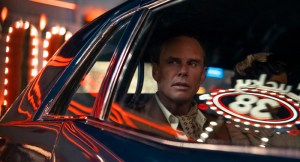Girls5eva Season 2 Cast, Creator on the Agency That Comes with Adulting
"There's bravery that comes with getting older. There's a different kind of courage," series star Sara Bareilles says.
From 30 Rock to Unbreakable Kimmy Schmidt to Great News, one of the ongoing themes in producers Tina Fey and Robert Carlock’s catalog of work is that of a woman whose potential is squandered or ruined by a man.
In Girls5eva, the Peacock series created by Meredith Scardino and executive produced by Fey and Carlock, it’s not so much one man as an entire industry built on sexualizing young women. And, oh yeah, it’s a musical comedy.
Now starting its second season, which premieres May 5 on the streaming channel, the series stars Renée Elise Goldsberry, Sara Bareilles, Paula Pell, and Busy Philipps as the remaining members of a ’90s girl group. Now, as adults, they realize that a lot of what they went through — and what they were forced to sing about — was not OK.
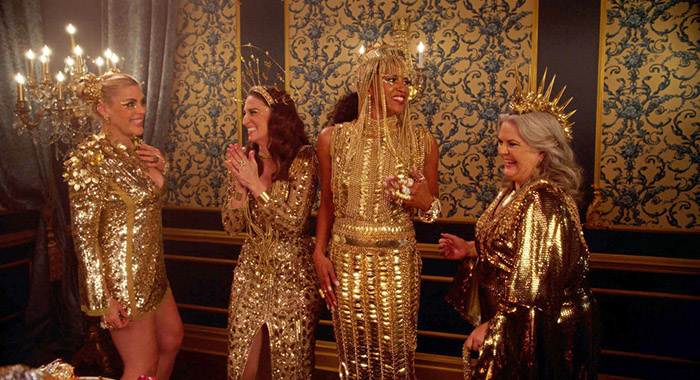
(Photo by Peacock)
But if the first season was about the now-foursome figuring out how to stage a comeback, the second is about how they can harness that power and be accepted warts and all (seriously — there’s a whole storyline one episode about Goldsberry’s Wickie having an ugly foot she’s afraid to show the paparazzi).
“I felt like they had this crazy experience in their early 20s or late teens. And from it, they were all, in a weird way, trapped in amber,” Scardino says of how stunted the characters were at the start of the show. She says that “the group getting back together in the present is a catalyst to reawakened all of them. And they help each other break out of that amber.”
It can also be seen in the musical numbers. Executive producer and composer Jeff Richmond says that the first season was influenced by older songs, (A sample lyric from the Girls5eva “classic,” “Dream Girlfriends”: “We’ve got the kind of birth control that goes in your arm / And tell me again why Tarantino’s a genius”). But this season pulled from female songwriters of today like Olivia Rodriguez, Dua Lipa and Adele (some more progressive lyrics from this year’s “Momentum”: “we’re contenders/ but we can be tender” and “courageous!/don’t care what our age is”).
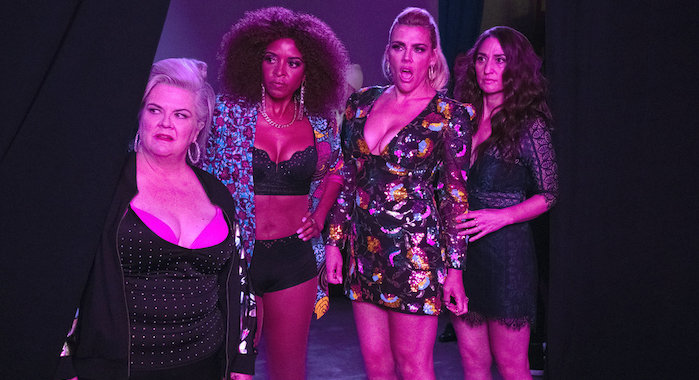
(Photo by Heidi Gutman/Peacock)
“I love how ambition turns all of them into something they didn’t know they could be,” Goldsberry says, noting that this season Wickie realizes that the band needs a publicist. So she channels herself into one. She’s called Amanda.
Scardino recognizes that no one, not even fictional characters, can completely evolve in a matter of weeks or months. But, she says, this season we’ll see them “grow as people and find their voice and get more agency and diagnose bad behaviors that they’ve had over the years.”
For Bareilles’ Dawn, who had always wanted to be a songwriter, this means gaining confidence to step out of her role as a mother to her young son and attempt to put some of the parenting responsibility on her husband, Scott (Daniel Breaker) — if the other moms at school would just please add him to the email chain. It’s an experience Scardino took from her own life and also a humorous way to look at society’s emotional labor debate that’s been brewing for years.
“This season feels so good for her because she’s really allowing herself to dream and to get specific about what she hopes to see happen,” Bareilles says. “She’s not unhappy in her family life. But it feels like something that occurred rather than very definitive choices for her life path.”
She adds that, personally, “I don’t necessarily see aging as sad … I think it’s about evolution. So much more bravery comes with getting older.”
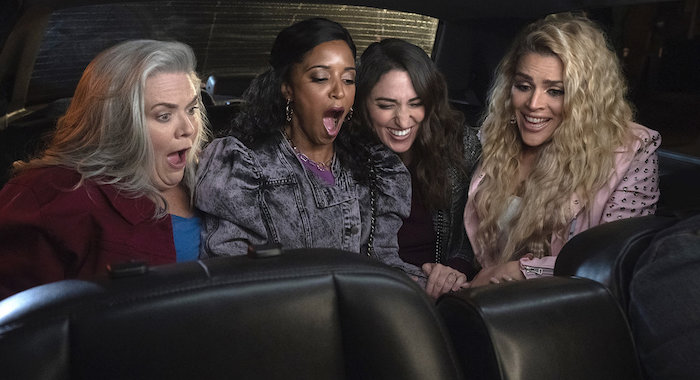
(Photo by Heidi Gutman/Peacock)
These life changes also don’t mean that the characters won’t be questioning themselves and what they believe defines them. Philipps’ Summer is married to Andrew Rannells’ Kev, a former boy-bander who is revealed as both gay and cheating on her. They’re also involved in a Hollywood mega-church and have parlayed their 15 minutes of music fame into influencer stardom. So what would divorcing him mean for her brand? And is a “brand” even a real depiction of you?
“I think there is something ripe for skewering in the hypocrites of the world,” Philipps says of going after these kinds of religious organizations. “But I think Summer really hemmed in by that, which I think is relatable to a lot of people … when you know a thing as the only thing in your life and then you have a creeping realization that it’s not exactly right for you? Re-evaluating that, especially in your 40s, is complicated.”
The show doesn’t just mine emotional trauma. For Pell, a lot of her character Gloria’s pain is physical and based on actual experiences. She injured her knee last summer right before the start of production on season 2. She says she was terrified she’d screw up filming schedules, which people pointed out was a very much something the don’t-rock-the-boat Gloria would do — and so would a lot of other women who are conditioned to grin and never admit when the workload is too much. It was written in that she’d hurt herself during an improvised jump-kick in the first episode. A Percocet-induced fantasy sequence ensues.
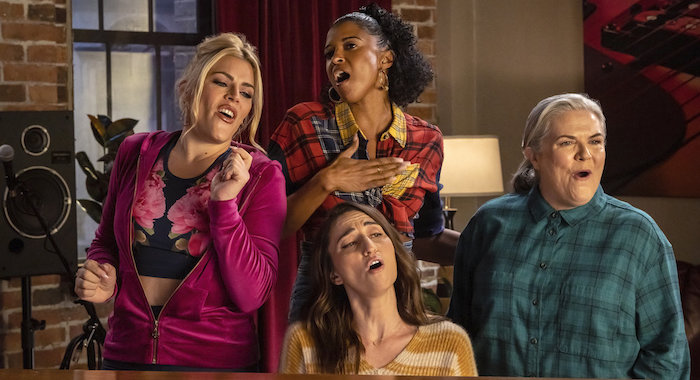
(Photo by Zach Dilgard/Peacock)
All of this is women’s empowerment is wonderful. But is the band’s music supposed to be any good? Richmond is known for a genre of musical storytelling that feeds off of joke lyrics and word play. And Philipps says there’s a scene this season where she and Bareilles are singing a cappella “a song that, lyrically, is ludicrous. But when we sang it together, I was like, ‘Oh, we’re the Indigo Girls. We are a two-lady, acoustic group.”
The songwriting, like the characters who write them, are an act in progress.








